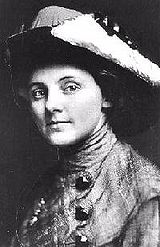- Anna Louise Strong
-
Anna Louise Strong (24 novembre 1885 – 29 march 1970) était une journaliste américaine du XXe siècle et une militante, plus connue pour ses écrits et son soutien pour les mouvements communiste de l'Union sovietique et de la République populaire de Chine.
Critiques
Dans l'ouvrage Tibet, Tibet Une histoire personnelle d'un pays perdu, l'écrivain et historien britannique Patrick French écrit que dans les années 1960 et 70, les sympathisants communistes venaient visiter le Tibet en se félicitant de la politique qu'y menait Pékin[1]. Pierre Ryckmans, sous le pseudonyme de Simon Leys, fut le premier à dénoncer ce phénomène dans Ombres chinoises publié en 1974. Jusqu’au début des années 1980, personne ne pouvait visiter le Tibet sans un visa spécial de Pékin. Cette situation a conduit à la publication d’ouvrages, que Patrick French qualifie de honteux tellement ils sont mensongers, dont l'ouvrage When Serfs Stood Up in Tibet d'Anna Louise Strong[1].
Selon John Powers, son ouvrage When Serfs Stood Up in Tibet utilise les termes de la propagande chinoise et a été publié par le gouvernement chinois[2].
Joshua Michael Schrei, un militant des droits de l'homme, a écrit, dans un article publié par l'association Students for a Free Tibet, une critique détaillée expliquant notamment que Anna Louise Strong a une prédilection romantique pour le maoïsme et a utilisé principalement des sources fournies par le gouvernement chinois qui sont sujettes à caution. Elle ne parlait ni le tibétain ni le chinois, si bien que ses sources historiques sont limitées[3].
Notes et références
- Patrick French : Tibet, Tibet Une histoire personnelle d'un pays perdu, traduit de l'anglais par William Oliver Desmond, Albin Michel, 2005 Page 294
- (en) John Powers, History as propaganda: Tibetan exiles versus the People's Republic of China, 2004, page 167
- (en) Joshua Michael Schrei, A Lie Repeated - The Far Left’s Flawed History of Tibet : « Anna Louise Strong, A. Tom Grunfeld, and Roma and Stuart Gelder. The fact that all of these historians had a romantic predilection towards Maoism and drew mostly on Chinese government statistics should surely be cause for concern as far as their legitimacy as source material. (…) Neither Parenti, Strong, Grunfeld, nor the Gelders speak Tibetan — or Chinese for that matter — so the body of historical literature on the Tibet issue that is available to them is extremely limited. Tom Grunfeld never went to Tibet until after his book was published. (…) Grunfeld repeatedly draws on the writings of a handful of British colonial explorers, who — as explorers often do — wrote down every piece of suspicious folklore and hearsay as fact. (…) Grunfeld also makes extensive use of the writings of Sir Charles Bell, who he quotes regularly and with no apparent regard for context. Bell’s stance was actually that Tibetans had been brutalized by the Chinese army and that Tibet was an independent nation of far greater ‘character’ than its neighbor. This seems to elude Grunfeld, who chops up Bell’s sentences in order to isolate the worst and most sensational aspects of Tibetan society and present them as fact. Grunfeld also makes cultural blunders that would make freshmen history students squirm. (…) as Tashi Rabgey points out in her dissection of Tom Grunfeld’s Making of Modern Tibet, the three social classes that Grunfeld and Strong lump Tibetans into — landowners, serfs, and slaves — have no relation to the actual breakdown of Tibetan society. It is a completely arbitrary classification that has no basis in reality — Tibetan society was never classified along these terms. (…) Not only are Strong and Grunfeld’s breakdowns of Tibetan society grossly miscategorized, their observations and criticisms are entirely removed from chronological and temporal reality. Folklore from hundreds of years ago, local myths, explorer’s whimsy, and selective historical incidents are presented all together as static truth. Every single bad thing, every monstrosity real or imagined that occurred in Tibet between 1447 and October 6, 1950 is ‘how it was’ in ‘old Tibet.’ Fundamentally, this is not history. It is the crudest form of argumentative politics, drawing on selective quotes from non-native history — quite often the history of the occupiers themselves — and presenting it as fact. »
Liens externes
Catégories :- Communiste américain
- Naissance en 1885
- Décès en 1970
Wikimedia Foundation. 2010.

